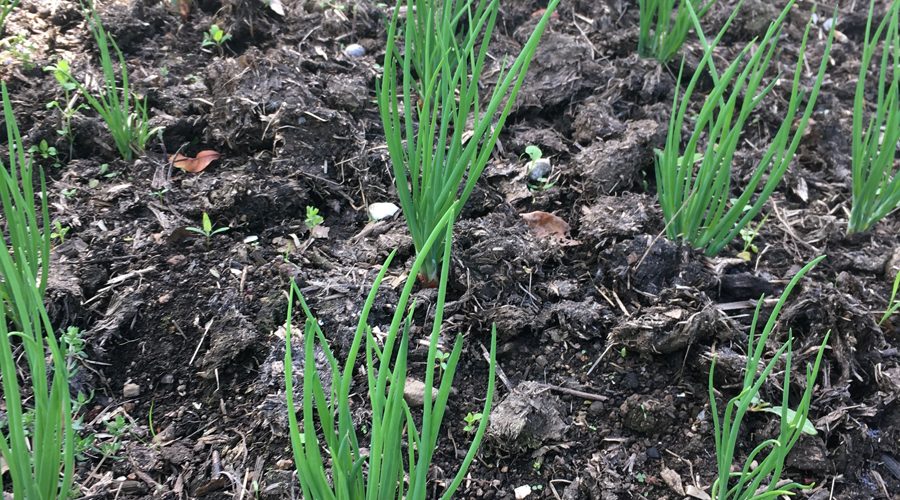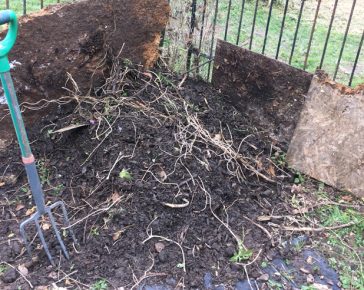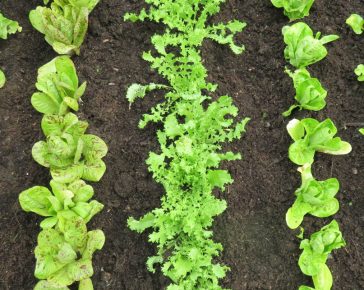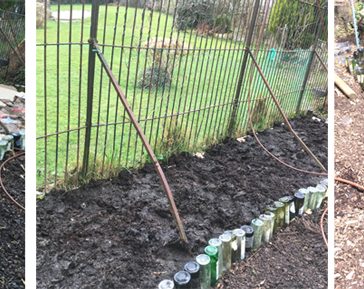My veg gardening involves a lot of mulching, and I cannot recommend it highly enough. Honestly, if there’s one thing that I could recommend to all veg growers, it would be to mulch heavily if you are growing in the ground/soil (as opposed to growing in pots and planters filled with compost).
Mulching helps to lock moisture into the soil. Obviously this is a huge benefit during the longer spells of dry weather as it means that your plants will be able to access water.
It’s a really good thing to do if you’re going away at all. I mulched just before I went away for two weeks. I got lucky, in that we had a huge downpour the day before I mulched, so there was plenty of rainwater held in the soil when I applied the mulch. Thereafter, even though many of the plants were still very young, they didn’t get a drop of water and when I returned, they were thriving. In fact, I didn’t even water them when I came home – not for another week when some of the leaves started to turn a little yellow and I could see that they needed more water.
Mulching would also be well worth doing if you have a hosepipe ban coming in your area or if you just need to be careful with watering. I’d suggest first watering carefully those plants that really need it, and then mulching with, ideally, compost. I’m also a huge fan of Strulch which is a branded product of treated straw mulch – I find it excellent – and I am newly trying out using grass clippings although I’m in early days with that so can’t give you the lowdown just yet. Still, I have seen friends’ plots where they’ve used grass clippings to mulch, and their plants have been thriving.
My preference would always be to mulch an entire bed – the more you can cover bare soil, the better. This is in line with No Dig gardening, which is what I tend to follow (see related posts below for more on that if you are interested) and comes from the principal that nature does not leave soil bare – weeds move in, leaves fall and provide ground cover etc etc – and mulching is something we can do to help to keep the soil in our plots healthier. Doing an entire bed also helps to keep weeds down – I’ve done very little weeding this summer, and what I have done has largely been in the two beds that I didn’t mulch (because I ran out.) If you can’t scrabble enough mulch together to do the whole bed, then do a little molehill around the base of each plant if you can – any amount of compost or mulch to cover the soil around the roots will help.
And for those of you who are thinking “what on earth is mulching” don’t panic – it is so easy. I also had no clue what it really meant when I started out. Essentially, all it is is covering the surface of the bare soil with something, whether it is fresh compost, seaweed, straw, or even one of those black compostable weed-blocking sheets. My own style of mulching, as I’ve kind of mentioned, is to simply add a thick layer of multi-purpose compost (or Strulch) on top of the soil. Sometimes I use my own compost, but I rarely have enough so I just buy in extra stuff. It can get pricey, depending on how big your plot is etc. I have used the compost from the local waste company before, which comes out at about £1 a bag – it’s not perfect, especially not in terms of environmental friendliness, but if you’re on a budget you could have a look into that. Equally, if you’re on a budget and you have grass clippings, I’d definitely give that a go but just be careful to leave a small circle around the base of the stalk so that the grass clippings don’t actually touch as this can be harmful to the plants as the grass starts to break down.




